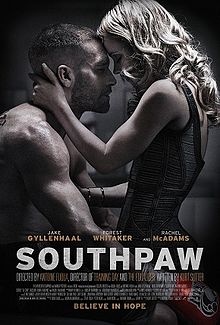THE AISLE SEAT - by Mike McGranaghan
"SOUTHPAW"

There have been a lot of boxing movies over the decades, and most of them are fueled by the same general idea: the boxer has an even tougher fight outside the ring than in it. Of course, how that idea gets executed is what makes the difference between Raging Bull and Grudge Match. (Or Rocky and 1992's Gladiator.) Antoine Fuqua's Southpaw has a lot of great elements to it, most notably an ace cast. At the same time, it tries a bit too hard to be meaningful, and therefore doesn't quite succeed as fully as it would like to.
Jake Gyllenhaal plays light heavyweight champion Billy Hope. After a brutal fight, which he wins, wife Maureen (Rachel McAdams) once again begs him to give up boxing, for the sake of their young daughter, Leila (Oona Laurence). He agrees, much to the chagrin of manager Jordan Mains (Curtis 50 Cent Jackson). During a press conference to announce his decision, Billy is taunted by an up-and-coming boxer who had hoped to get him in the ring. Their conflict spills over into the lobby of the building where the announcement is taking place. This leads to a tragedy in which Maureen is killed and Leila is subsequently removed from the home by Child Protective Services. (That's all conveyed in the movie's trailer, so please don't accuse me of spoiling secrets.) Depressed, drunken, and unemployed, Billy approaches trainer Tick Wills (Forest Whitaker) for help in getting his life back together and bringing his daughter home.
Southpaw was written by Kurt Sutter (Sons of Anarchy), and his screenplay gives Jake Gyllenhaal a great role. The actor visibly transforms himself, displaying a boxer's physique and inventing different postures to convey Billy's moods. When he's angry, he straightens up, as though he's going to box, even if not facing another fighter. When he's insecure or down, he almost withdraws into himself, bringing one arm up and ducking his head down a bit, as though blocking a punch. Gyllenhaal uses physicality brilliantly in the film, suggesting that Billy has boxing so ingrained in him that he lives every moment as though it's a title fight. He also makes the character's emotional anguish ring through in every scene. This is another phenomenal performance from the actor.
McAdams and Whitaker are very good, as well, and on the filmmaking side, Fuqua stages the boxing sequences with brutal intensity. He does something I've never seen before, which is to make the camera a substitute for a boxer's head. There's a dramatic bout in which Billy takes blows from his competitor, which we see from his point of view. When he gets hit, the camera bounces around, just as his head would. It's a very effective technique that conveys what it must be like to get pummeled minus the pain, of course.
The big problem with Southpaw lies in its tone. It is certainly admirable that the film is willing to be grim; that's all it is, though. Billy undergoes one personal calamity after another, and the movie lingers on all of them in detail. There are no moments of levity to break them up, nor does the tone ever fluctuate from the grimness. Until the last twenty minutes or so, every scene is designed to show Billy suffering. That causes the movie to feel one-note and, consequently, slightly oppressive.
Just as troubling is that the redemption theme isn't entirely earned. Billy is court-ordered to be in anger management and individual counseling, yet there isn't one single scene showing him in either of these things. Services like that are where a person would be most likely to have a breakthrough, because it's where they're actively engaged in analyzing their own behavior. Showing us how Billy is confronted or challenged in such situations would have gone a long way toward making his healing more credible.
Jake Gyllenhaal's performance is definitely worth seeing, although Southpaw as a whole doesn't quite live up to the high standard he sets. The movie hits the same beat too often, with little variance. With some expansion of Billy's recovery and an occasional light moment to balance out the darkness it might have stood near the top of the list of boxing movies. Instead, it falls somewhere in the middle.
(![]()
![]() 1/2 out of four)
1/2 out of four)
Southpaw is rated R for language throughout, and some violence. The running time is 2 hours and 3 minutes.
Buy a copy of my book, "Straight-Up Blatant: Musings From The Aisle Seat," on sale now at Lulu.com! Paperback and Kindle editions also available at Amazon.com!


